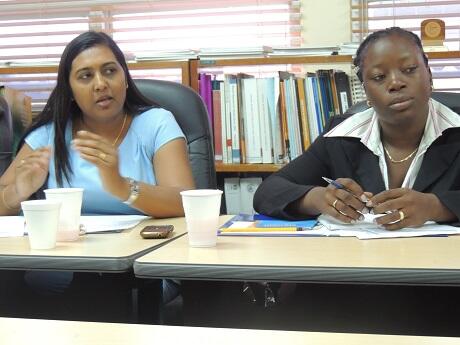An eight member delegation from the Republic of Suriname located in South America visited Jamaica on a study tour from March 10-13 to learn about Jamaica’s experiences in combatting gender-based violence. The delegation held talks with various stakeholders from the government and civil society. These included the Ministry of Justice, Victim Support Unit, Office of the Director of Public Prosecutions, Centre for the Investigation of Sexual Offences and Child Abuse (CISOCA), Woman Inc., the Bureau of Women’s Affairs, the Women’s Centre of Jamaica Foundation. Among the delegation were high level officials from the judiciary, the police, and social services in Suriname.
Team leader, Mrs. Bidiawatie Nanden-Harpal, Acting Head, Bureau of Women and Child Policy, Ministry of Justice and Police said the experience was very useful as the delegation had the opportunity to see some of the practices, approaches and tools that Jamaica utilizes for data gathering and reporting on cases of gender-based violence. Special note was made of CISOCA’s role in collecting information on sexual offences from across all parishes. This along with the work of the Planning Institute of Jamaica in maintaining a statistical database of the various social and economic indicators including gender based violence was seen as a good practice in tracking domestic violence indicators and reducing double counting
She further stated that the team was very impressed with the fact that Jamaica’s Bureau of Women’s Affairs is housed in the Office of the Prime Minister (OPM) and that the OPM has direct oversight responsibility for the unit. This she said is an important statement about the political commitment of the government to issues of gender equality.
Mrs. Nanden-Harpal indicated that the insights gathered while in Jamaica will inform development of a comprehensive plan to work with perpetrators of domestic violence. The main aim she noted is to help them to stop this violent behavior.
“We heard about the Partnership for Peace Programme and other initiatives that are used in Jamaica and we wanted to see what services we need to provide for perpetrators because in order to stop domestic violence you have to look at both the victims and the perpetrators,” she noted.
Suriname’s Domestic Violence Act mandates counseling and psycho-educational interventions for perpetrators. According to Mrs. Alida Johanns, a member of the Court of Justice (Supreme Court) in Suriname, one of the main challenges faced in implementing this obligation was determining which perpetrators were eligible for counseling. She said the experience of the Partnership for Peace Programme, which relies on the probation officers to make that determination was instructive. “In the absence of probation officers, since we do not have them in Suriname, we can now go back and develop a protocol for identifying perpetrators who need the counseling”, she said.
The Mission was organized by UNFPA, the United Nations Population Fund Sub-regional Office for the Caribbean at the request of the Government of Suriname through the Ministry of Justice and Police.
Siti Batoul Oussein, Deputy Director/Deputy Representative, Officer in Charge, UNFPA Sub- regional Office for the Caribbean who greeted the team on arrival in Jamaica said UNFPA was thrilled to support the exchange of knowledge between the two countries around combating gender based violence.
“We value the study tour because it is one of the key roles we play in improving and facilitating South-South knowledge sharing, networking, exchange of information and best practices, policy analysis and coordinated actions on major issues of concern in support of the implementation of the Programme of Action of the International Conference on Population and Development (ICPD) and progress towards achievement of the Millennium Development Goals (MDGs).”
At the end of four day study tour, members of the delegation moved on to Trinidad & Tobago where they examined the experience of that country in this same area.
.


